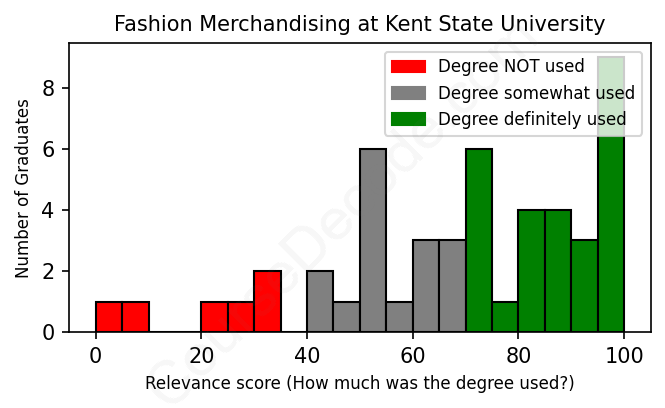
First, some facts. Of the Fashion Merchandising graduates from Kent State University we've analyzed , here's how many have used (or NOT used) their degree in their career:

These are estimates based on AI analysis of 49 LinkedIn profiles (see below).
The verdict? Slightly above average. Overall, with an average relevance score of 68%, Fashion Merchandising graduates from Kent State University have a slightly higher likelihood (+1%) of finding work in this field compared to the average graduate across all fields:
And for comparison, here's the chart for all profiles we've looked at across all degrees.
Also, after graduating, only 10% of these graduates have pursued further education other than another Bachelor's degree (such as a Masters degree or other), compared to the average across all profiles of 35%. This suggests a Bachelors degree is enough for most Fashion Merchandising graduates, and it's normal to look for work straight after graduation.
See the details:
|
Relevance score: 72% We think this person has gone into a career highly relevant to their degree. We think this person has gone into a career highly relevant to their degree.
DEGREE INFOGraduated in 2019 from Kent State University with a Bachelor of Science - BS in Fashion Merchandising. No other secondary education since. JOB HISTORY SINCE GRADUATIONVisual Merchandiser Nordstrom Jun 2019 - Oct 2019 Customer Service Representative  Nordstrom Nov 2019 - May 2021 Sales Associate  Nordstrom May 2021 - Sep 2021 Studio Stylist  EXPRESS Sep 2021 - Aug 2022 Engagement Lead  EXPRESS Aug 2022 - Aug 2023 Assistant  The Buckle, Inc. Aug 2023 - Present ABOUTI am a passionate, caring, competitive, and hard working individual with a drive to continually challenge myself to grow in my skill set and knowledge base for any role I am in. |
The top 10 most common jobs done by the graduates we've analyzed (ranked most common to least) are:
Based on the LinkedIn profiles of graduates from Kent State University with a degree in Fashion Merchandising, there are several common job roles they occupy. Many have landed positions as **Sales Associates, Assistants, and Merchandisers** in various fashion retail settings like Nordstrom, Express, and Victoria's Secret. These positions often involve customer interaction, sales strategies, and visual merchandising, which are somewhat related to the skills learned during their studies. However, the relevance of these roles to fashion merchandising varies widely. For instance, roles like Sales Associates focus more on retail and customer service rather than direct merchandising skills.
On the more relevant side, several graduates secured roles that align directly with their degree, such as **Assistant Buyers, Visual Merchandisers, and Product Development Coordinators**. These positions require a solid understanding of fashion trends, inventory management, and product selection—areas where their academic training comes in handy. However, it’s noteworthy that many grads also ventured into roles such as marketing or management positions that, while they might have some crossover with fashion merchandising principles, do not utilize the core competencies acquired during their education in a strong way. Overall, while some graduates are actively employed in areas directly tied to fashion merchandising, a notable number have taken paths that are only tangentially related, suggesting a varied landscape in how effectively their degrees are translating to the job market.
Here is a visual representation of the most common words in job titles for Fashion Merchandising graduates (this is across all Fashion Merchandising graduates we've analyzed, not just those who went to Kent State University):

Graduates from the Fashion Merchandising program at Kent State University tend to embark on a variety of career paths, with many starting in roles that are directly linked to retail and merchandising. For example, many early positions include titles like Sales Associate, Intern, or Visual Merchandiser, often based in well-known fashion retailers such as Macy's, Nordstrom, and Victoria's Secret. These entry-level jobs provide a solid foundation in the industry, allowing graduates to gain valuable experience in sales, customer service, and product management. It’s pretty common for these fresh graduates to start as interns or assistants, especially in the first year or two following graduation, while they build their skills and networks.
Looking further down the line, say five or ten years post-graduation, many of these alumni find themselves advancing into more responsible roles such as Buyers, Merchandising Managers, or even Marketing Managers. Some graduates branch out into auxiliary fields like e-commerce and product development. For instance, individuals who began as Junior Merchandisers or Sales Associates have moved into roles as Senior Buyers or Account Executives, showcasing a promising trajectory. However, it’s also worth noting that not every grad sticks strictly to Fashion Merchandising—some find themselves in unrelated fields or roles like administrative positions, which can be a bit of a detour from their initial studies. Overall, while many graduates successfully land relevant roles in the fashion industry, it’s a mixed bag with different paths for different people. Still, it seems the program does a good job of setting students up for a variety of career options within fashion and retail.”
Getting a Bachelor’s degree in Fashion Merchandising at Kent State University, or really anywhere, can be a mixed bag. It definitely has its challenging moments, especially with the creative and analytical aspects you have to juggle, like understanding trends and market analysis. However, if you’re passionate about fashion and enjoy hands-on projects—like styling, visual merchandising, and working on marketing strategies—it might feel a bit easier for you because you’re engaged in what you love. Overall, it's probably on the easier side compared to more traditional majors like engineering or physics, but it still requires a good amount of hard work, especially if you want to stand out!
Most commonly, in the LinkedIn profiles we've looked at, it takes people 4 years to finish a Bachelor degree in Fashion Merchandising.
Looking at the career paths of these Kent State University Fashion Merchandising graduates, it seems like they've generally done pretty well for themselves in terms of salary, especially considering the fashion industry's competitive nature. Many of them have moved up to managerial roles and specialized positions like buyers and marketing managers, which typically come with a decent paycheck. For instance, positions at well-known companies like Kohl's, Victoria's Secret, and Express not only provide valuable experience but also suggest that they’re likely earning more than just entry-level wages as they climb the career ladder. That said, some earlier roles, like sales associates and internships, probably didn’t pay very much, so they may have started off slow. But overall, it looks like most of them have made a good jump in earnings as they gained experience in the industry!
Here is a visual representation of the most common words seen in the "about" section of LinkedIn profiles who have a Bachelor degree in Fashion Merchandising (this is across all Fashion Merchandising graduates we've analyzed, not just those who went to Kent State University). This may or may not be useful:

Here are all colleges offering a Bachelor degree in Fashion Merchandising (ordered by the average relevance score of their Fashion Merchandising graduates, best to worst) where we have analyzed at least 10 of their graduates:
| College | Score | Count |
|---|---|---|
 LIM College LIM College
|
70 | 43 |
 University of North Texas University of North Texas
|
69 | 20 |
 Kent State University Kent State University
|
68 | 49 |
 Fashion Institute of Technology Fashion Institute of Technology
|
66 | 21 |
 Philadelphia University Philadelphia University
|
62 | 14 |
 The University of Georgia The University of Georgia
|
59 | 13 |
 California State University-Long Beach California State University-Long Beach
|
56 | 12 |
 Texas State University Texas State University
|
54 | 24 |
 Marist College Marist College
|
54 | 17 |